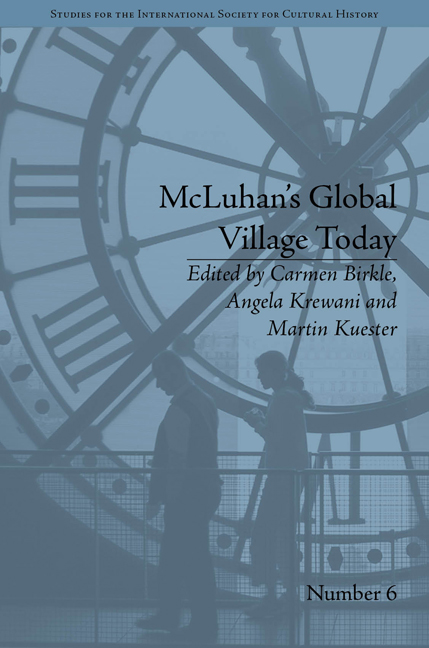Book contents
- Frontmatter
- CONTENTS
- List of Contributors
- List of Figures
- McLuhan's Global Village Today: An Introduction
- Part I McLuhan and Media Theory
- 1 In-Corporating the Global Village
- 2 Metaphorical Effects: McLuhan's Media
- 3 Hot/Cool vs Technological/Symbolic: McLuhan and Kittler
- 4 Global Immediacy
- 5 The Complementary Aspects of Marshall McLuhan and Postmodernism in the Literary Study of the Internet: Exemplified in the Rhizome Theory of Gilles Deleuze and Félix Guattari
- 6 Dubjection: A Node (Reflections on Web-Conferencing, McLuhan and Intellectual Property)
- Part II McLuhan and Literature
- Part III McLuhan and Technical Media
- Notes
- Index
2 - Metaphorical Effects: McLuhan's Media
from Part I - McLuhan and Media Theory
- Frontmatter
- CONTENTS
- List of Contributors
- List of Figures
- McLuhan's Global Village Today: An Introduction
- Part I McLuhan and Media Theory
- 1 In-Corporating the Global Village
- 2 Metaphorical Effects: McLuhan's Media
- 3 Hot/Cool vs Technological/Symbolic: McLuhan and Kittler
- 4 Global Immediacy
- 5 The Complementary Aspects of Marshall McLuhan and Postmodernism in the Literary Study of the Internet: Exemplified in the Rhizome Theory of Gilles Deleuze and Félix Guattari
- 6 Dubjection: A Node (Reflections on Web-Conferencing, McLuhan and Intellectual Property)
- Part II McLuhan and Literature
- Part III McLuhan and Technical Media
- Notes
- Index
Summary
When the term ‘metaphor’ appears for the first time in the chapter on ‘Roads and Paper Routes’ of Marshall McLuhan's Understanding Media, it does not determine a trope in the text. Instead, the word ‘metaphor’ is used in its literal translation from the Greek language: ‘The word “metaphor” is from Greek meta plus pherein, to carry across or transport’.
In Greek ‘metaphor’ means ‘transport’, which seems to explain why it is used in a chapter on transportation. However, the next sentence does not suggest as definite a relationship as this: ‘In this book we are concerned with all forms of transport, both as metaphor and exchange’. Suddenly, next to the literal ‘forms of transport’, ‘metaphor’ does not seem that literal any more. Here, ‘metaphor’ is not simply another word for transport. It describes transport in a rather specific way: in a metaphorical way.
In this essay, I would like to address the deployment of the metaphor in McLuhan's theory of media. In his earliest writings, as well as in his posthumously published works on media and mediality, metaphor plays a particular role. In Understanding Media metaphor makes several decisive appearances, one of which I have just presented. Therefore, I would like to suggest that McLuhan's concept of media results from a constant negotiation with the concept of metaphor.
- Type
- Chapter
- Information
- McLuhan's Global Village TodayTransatlantic Perspectives, pp. 15 - 20Publisher: Pickering & ChattoFirst published in: 2014



